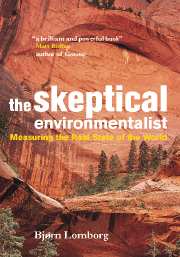Book contents
- Frontmatter
- Contents
- List of figures
- List of tables
- Preface
- Language and measures
- Acknowledgements
- Permissions
- Part I The Litany
- Part II Human welfare
- Part III Can human prosperity continue?
- 8 Are we living on borrowed time?
- 9 Will we have enough food?
- 10 Forests – are we losing them?
- 11 Energy
- 12 Non-energy resources
- 13 Water
- 14 Conclusion to Part III: continued prosperity
- Part IV Pollution: does it undercut human prosperity?
- Part V Tomorrow's problems
- Part VI The Real State of the World
- Notes
- Bibliography
- Index
8 - Are we living on borrowed time?
Published online by Cambridge University Press: 05 March 2013
- Frontmatter
- Contents
- List of figures
- List of tables
- Preface
- Language and measures
- Acknowledgements
- Permissions
- Part I The Litany
- Part II Human welfare
- Part III Can human prosperity continue?
- 8 Are we living on borrowed time?
- 9 Will we have enough food?
- 10 Forests – are we losing them?
- 11 Energy
- 12 Non-energy resources
- 13 Water
- 14 Conclusion to Part III: continued prosperity
- Part IV Pollution: does it undercut human prosperity?
- Part V Tomorrow's problems
- Part VI The Real State of the World
- Notes
- Bibliography
- Index
Summary
In Part II we saw that by and large all measurable indicators of human welfare show improvement. Indeed, it is difficult to contest these indicators. But maybe we are living on borrowed time.
This is the typical objection we hear from organizations such as Worldwatch Institute:
The twentieth century has been extraordinarily successful for the human species – perhaps too successful. As our population has grown from one billion to 6 billion and the economy has exploded to more than 20 times its size in 1900, we have overwhelmed the natural systems from which we emerged and created the dangerous illusion that we no longer depend on a healthy environment.
In other words, it may be true that things have been going well. But actually, things have been going too well. This development cannot continue. The natural foundations will collapse. With an oft-repeated metaphor, we are told: “Just as a continuously growing cancer eventually destroys its life-support systems by destroying its host, a continuously expanding global economy is slowly destroying its host – the Earth's ecosystem.”
Professor Ehrlich reiterates the same basic idea: economists are fond of pointing out that GDP and food availability per capita grow and grow. “But there is a fatal flaw in this argument: it is roughly equivalent to bragging about one’s ability to write a bigger check each month, while paying no attention to the balance in the account.”
- Type
- Chapter
- Information
- The Skeptical EnvironmentalistMeasuring the Real State of the World, pp. 91 - 92Publisher: Cambridge University PressPrint publication year: 2001
- 1
- Cited by



